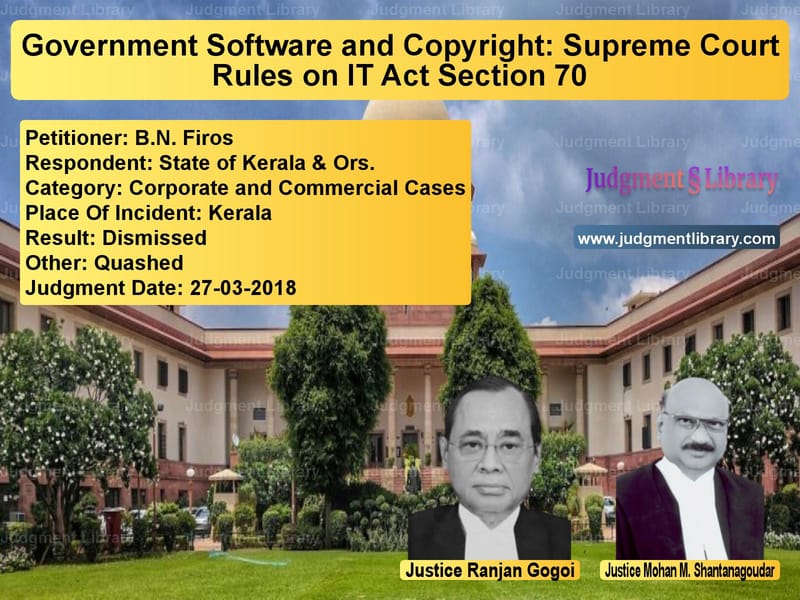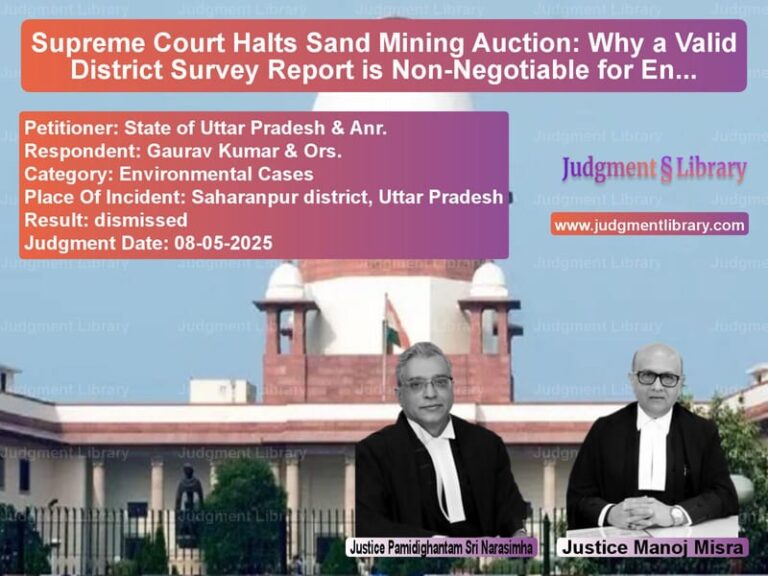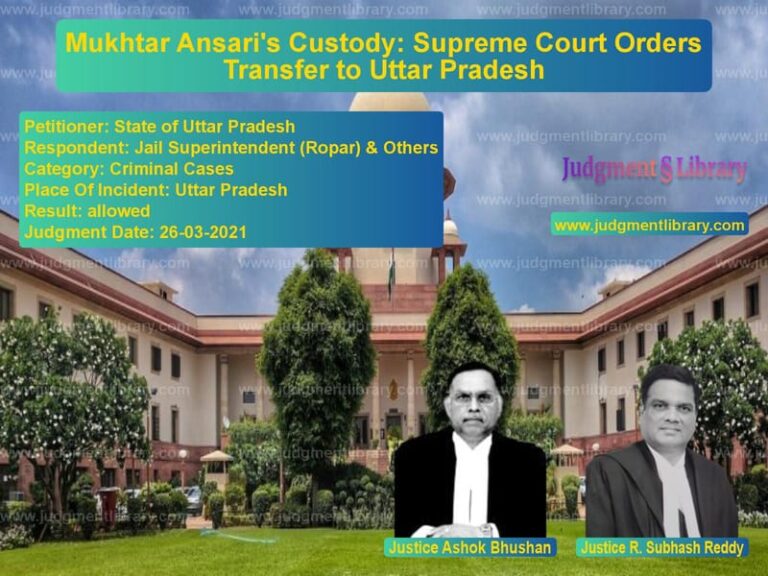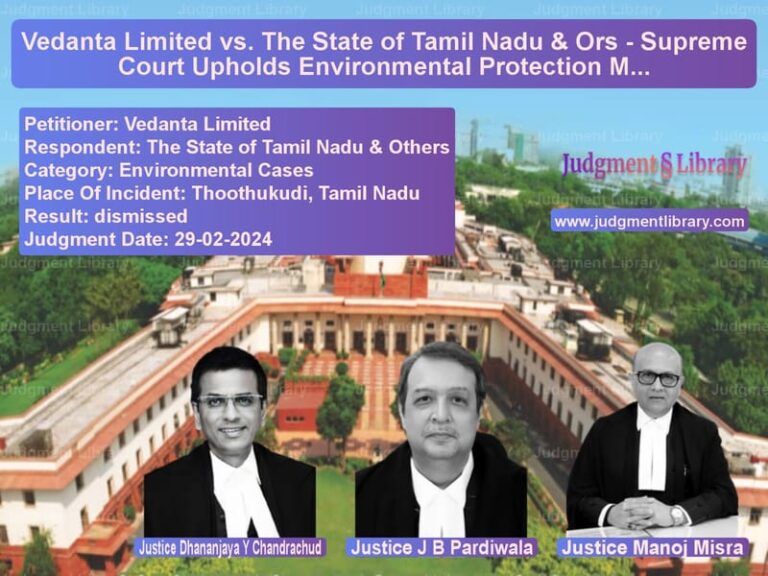Government Software and Copyright: Supreme Court Rules on IT Act Section 70
The case of B.N. Firos v. State of Kerala & Ors. is a landmark judgment concerning intellectual property rights, government software projects, and the interpretation of Section 70 of the Information Technology Act, 2000. The Supreme Court upheld the Kerala High Court’s ruling, rejecting the appellant’s claim of copyright over the ‘FRIENDS’ application software, which was declared a ‘protected system’ under the IT Act by the State Government.
Background of the Case
The dispute centers around the FRIENDS (Fast, Reliable, Instant, Efficient Network for Disbursement of Services) project initiated by the State of Kerala through the Centre for Development of Imaging Technology (C-DIT). This project aimed to create a single-window system for multiple government agencies’ bill collection services.
The appellant, B.N. Firos, proprietor of Comtech IT Solutions, claimed he had developed the FRIENDS application software as part of the Microsoft Developer Forum and provided it free of cost as per an agreement with Microsoft India Pvt. Ltd. He alleged that the Kerala Government and C-DIT attempted to transfer software elements to another company, infringing his copyright.
Petitioner’s Arguments
B.N. Firos filed a writ petition challenging:
- The notification issued on December 27, 2002, under Section 70(1) of the IT Act, declaring the FRIENDS software a ‘protected system’.
- The vires of Section 70 of the IT Act, alleging excessive delegation of legislative power.
- The infringement of his copyright under Section 17 of the Copyright Act, 1957.
He argued that:
- As the sole developer of the FRIENDS software, he held the first ownership rights under the Copyright Act.
- The government’s declaration of the software as a ‘protected system’ violated his copyright.
- His registration application for copyright was wrongly rejected due to a pending civil suit.
- The government had no legal basis to claim ownership over software developed by a private entity.
Respondent’s Arguments
The State of Kerala and C-DIT defended their actions, stating:
- The FRIENDS project was a government initiative, and all intellectual property rights (IPR) in its software vested in the government.
- Section 70 of the IT Act must be read in conjunction with the Copyright Act to harmonize its application.
- Clause 10 of the Memorandum of Understanding (MoU) between Total Solution Providers for E-Governance and the Kerala Government explicitly vested all IPRs of software developed for government projects with the government.
- Under Section 17(a) of the Copyright Act, if software was developed for a company like Microsoft, copyright vests with that company, not the individual developer.
Supreme Court’s Observations
The Supreme Court made several key observations:
1. Intellectual Property Rights in Government Work
The Court ruled that intellectual property rights in government software projects must be assessed under both the Copyright Act and the IT Act. It held:
“The High Court rightly construed that the power of declaration of a ‘protected system’ would only be in respect of ‘Government work,’ the copyright in which is acknowledged under Section 17(d) of the Copyright Act.”
2. Validity of Section 70 of the IT Act
The Court rejected the appellant’s argument that Section 70 of the IT Act was an excessive delegation of power. It ruled:
“The amendment to Section 70(1) of the IT Act by Act No. 10 of 2009 further circumscribes the power of declaration of protected systems, making it more stringent rather than arbitrary.”
3. Appellant’s Lack of Copyright Ownership
The Supreme Court dismissed the appellant’s copyright claim, stating:
“The appellant himself admitted that he developed the software for Microsoft and received consideration. Under Section 17(a) of the Copyright Act, Microsoft is the first owner of the copyright.”
4. Government’s Right to Declare ‘Protected Systems’
The Court ruled that the Kerala Government had acted within its rights by declaring FRIENDS software a ‘protected system’:
“The government, being the rightful owner under the MoU and the Copyright Act, had every authority to protect its digital infrastructure.”
Supreme Court’s Final Verdict
The Supreme Court upheld the Kerala High Court’s ruling and dismissed the appeal, ruling:
- The government’s declaration of FRIENDS software as a ‘protected system’ was legally valid.
- Section 70 of the IT Act did not suffer from excessive delegation.
- The appellant had no copyright claim as the software was developed for Microsoft.
- The MoU between the Kerala Government and Total Solution Providers clearly vested IPRs in the government.
Impact of the Judgment
This ruling has significant implications for software development in government projects:
1. Strengthening Government Control Over Critical IT Infrastructure
The ruling reinforces the government’s right to control digital resources developed for public administration.
2. Clarifying IPR in Government Software
The Court established that software developed under government contracts is government property unless explicitly assigned otherwise.
3. Limiting Private Copyright Claims
The decision clarifies that developers working under agreements with corporations or governments cannot claim copyright ownership.
4. Ensuring Secure IT Systems
By upholding Section 70 of the IT Act, the Court affirmed the government’s authority to protect its IT infrastructure.
Key Takeaways
- The Supreme Court ruled in favor of the Kerala Government, upholding its right to declare government software a ‘protected system.’
- Section 70 of the IT Act is constitutionally valid and does not confer unbridled powers.
- The appellant’s copyright claim was dismissed as the software was developed for Microsoft.
- The judgment reinforces government control over digital public services.
Conclusion
This Supreme Court ruling affirms that intellectual property rights in government software projects belong to the government unless explicitly transferred. The judgment strengthens the state’s ability to protect critical IT systems and prevents private developers from asserting undue copyright claims. By upholding Section 70 of the IT Act, the Court ensures that governments can safeguard public digital infrastructure while maintaining control over essential e-governance applications.
Petitioner Name: B.N. FirosRespondent Name: State of Kerala & Ors.Judgment By: Justice Ranjan Gogoi, Justice Mohan M. ShantanagoudarPlace Of Incident: KeralaJudgment Date: 27-03-2018
Don’t miss out on the full details! Download the complete judgment in PDF format below and gain valuable insights instantly!
Download Judgment: B.N. Firos vs State of Kerala & Or Supreme Court of India Judgment Dated 27-03-2018.pdf
Direct Downlaod Judgment: Direct downlaod this Judgment
See all petitions in Corporate Governance
See all petitions in Company Law
See all petitions in unfair trade practices
See all petitions in Judgment by Ranjan Gogoi
See all petitions in Judgment by Mohan M. Shantanagoudar
See all petitions in dismissed
See all petitions in Quashed
See all petitions in supreme court of India judgments March 2018
See all petitions in 2018 judgments
See all posts in Corporate and Commercial Cases Category
See all allowed petitions in Corporate and Commercial Cases Category
See all Dismissed petitions in Corporate and Commercial Cases Category
See all partially allowed petitions in Corporate and Commercial Cases Category







